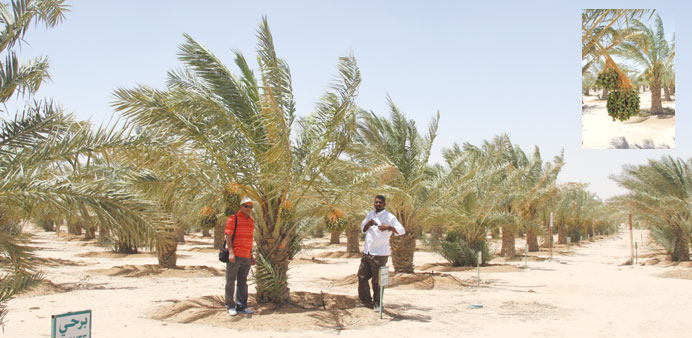Dr Talaat A Ahmed, associate professor of plant molecular biology, and agriculture engineer and farm manager Abu Baker A al-Taieb in front of date palms at the QU Farm. INSET: Bunches of dates on a palm at the QU Farm. PICTURE: Thomas Bonnie James.
Pioneering genetic research on date palms is progressing at the Qatar University Farm, located at Rawdat Al Faras, about 60km north of Doha. Spread over an area of 54.3 hectares, the scenic farm has 19 varieties of date palms from Qatar and the rest of the Gulf region.
“Genotyping the germplasm, identifying gene-related environmental stresses, effect of treated wastewater and use of bio-pesticides are among the thrust areas,” Dr Talaat A Ahmed, associate professor of plant molecular biology, Department of Biological and Environmental Sciences, told Gulf Times during a visit to the farm.
A major project, supported with a National Priorities Research Programme grant from the Qatar National Research Fund, for genotyping the germplasm to distinguish between the cultivars (cultivated varieties) using DNA marker, is in its final phase.
“We have completed two and a half years of the three-year project by genotyping almost all the germplasm collected and very soon we will write the scientific report which is to be submitted next year,” Dr Ahmed revealed.
The other components of the project are how to improve date palms with optimum watering, identifying the most appropriate fertiliser(s), comparison of the effect of irrigation with treated wastewater and desalinated water on the quality of the fruit, and initiating the application of bio-pesticides. We have published several research papers and gave presentations in conferences in the US, Europe and Malaysia,” he said.
“A group supervised by Dr Samir Mohamed Jaoua, head of the Department of Biological and Environmental Sciences, is working to initiate some bio-pesticides, as part of the project.
Qatar University (QU) researchers are not just genotyping, but linking the phenotype (an organism’s actual observed properties, such as morphology, development, or behaviour) with the genotype (an organism’s full hereditary information).
“For example, if we have an excellent date palm, we will find out the pattern of its DNA marker and also fingerprint it. In future, we can distinguish between different varieties of date palm using DNA markers alone and not just morphology or fruit character,” Dr Ahmed said.
The research team is also determined “to reserve the right of QU and Qatar in general for their endemic cultivars”.
“We have some very good quality date palms in this genotype collection, like the Naboot Saif, which has high sugar content and a very thin coat. It just melts in your mouth,” he said.
Sheshy, Khadrawy, Barhee, Succary, Hatamy, Anbara, Shabeeby, Sultana, Helaly, Khalas, Khush Zabad, Abu Main, Khanezy, Thuri, Zahidi, and Ashal Hassa are among the other varieties of date palms in the QU Farm.
Another research project started last year is aimed to isolate and identify genes related environmental stresses. Most of the work is being done in the lab to identify genes that make the date palm survive drought and salinity stress.
“We intend this year to properly package dates from the QU Farm, distribute some in the university and sell the rest to mobilise resources. Each type will be packaged separately,” Dr Ahmed said.
There is a plan to establish a research lab in the farm. “They will be based in two portacabins, one for male researchers and the other for female. Given the distance of the farm from QU, accommodation facilities are also to be built, if researchers have to stay overnight. Work is expected to start after the summer,” Dr Ahmed added.

